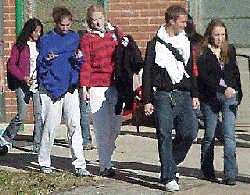Student Assistance Program (SAP)
What is SAP?
 The Student Assistance Program is a school based substance use and violence intervention program. Student Assistance is focused on prevention through intervention and is not aimed at collecting evidence for criminal prosecution.
The Student Assistance Program is a school based substance use and violence intervention program. Student Assistance is focused on prevention through intervention and is not aimed at collecting evidence for criminal prosecution.
What is SAP's Goal?
Most substance usage and/or violent behavior takes place off school grounds out of the jurisdiction of school officials, yet many other effects of this are reflected in students' performance in school. The goal of Student Assistance Program is to identify adolescents whose behavior, attendance, or grades indicate that they may have problems related to alcohol and/or other drug use or violence. Through the different steps that comprise the Student Assistance Program process, these at-risk adolescents are referred for a professional assessment and directed to appropriate services.
How Does SAP Work? CONFIDENTIALLY!
Any individual (school staff member, parent, community member, or student) can tell the Student Assistance Program team about his/her concern for a student. Students may refer themselves. A Concern Form can be submitted HERE or into one of the concern boxes located in the Health Room, Media Center, Counseling Office, and Student Commons or to a counselor or administrator. The Student Assistant Program team leader collects the concerns and a data collection process begins. Information is studied to determine any possible indicators, such as a drop in grades, increase in absences, frequent visits to the nurse or behavior problems. If there are insufficient indicators of a problem, the matter is dropped and all information is destroyed. If, however, the data collected indicates the need for further assessment, the information is then shared with the student's parent(s) or guardian, who are then encouraged to participate in the intervention process. Only the data collected is shared with the parent(s) or guardian.
Any information concerning who made the original referral is strictly confidential. A referral may be submitted without revealing the name of the concerned person. The Student Assistance Program team may be comprised of administrators, teachers, counselors, security personnel, instructional assistants, building service workers, office personnel, cafeteria workers, the school psychologist, school nurse, attendance secretary, pupil personnel worker, and other staff who may be in contact with students.
For More Information
Further information about the Student Assistance Program is available from your school counselor or administrator.
Early Warning Signs of Alcohol, Other Drug Use and/or Violence
Change in...
- Academic performance
- Attendance
- Family relationships
- Friends or social group
- Normal or usual behavior
- Participation in extracurricular activities
- Physical appearance
Access to or possession of firearms
Affiliation with gangs
Any alcohol or drug-related clothing, jewelry, or art
Association with drug users
Depressed
Expressed feelings of rejection
Fights
Involvement with the law
Intimidating and bullying behaviors
Pick-on or persecuted
Serious threats of violence
Uncontrolled anger
Violent and aggressive behaviors
Withdrawal from peers
Help by Phone
| Montgomery County Community Crisis Center | 240-777-4000 |
| Montgomery County Hotline | 301-738-CALL (2255) |
| MCPS Safe Schools Hotline | 301-517-5995 |
| Alcoholics Anonymous (AA) | 202-966-9115 |
| AA Spanish Hotline | 301-587-6191 |
| AL-Anon & Alateen | 202-635-2023 |
| Narcotics Anonymous | 1-800-543-4670 |
| Cocaine Anonymous | 202-726-1717 |
| Drug Tip Line | 240-773-3784 |
| Bethesda Youth Services | 301-593-1160 |
| Bethesda Police District | 301-652-9200 |
| Maryland Youth Crises Hotline | 1-800-422-0009 |
| Youth America Hotline | 1-877-968-8454 |
| Suicide Prevention Lifeline | 1-800-273-8255 |
